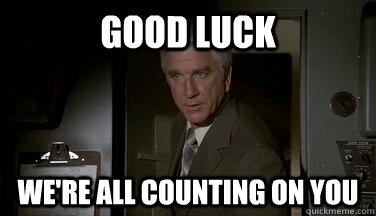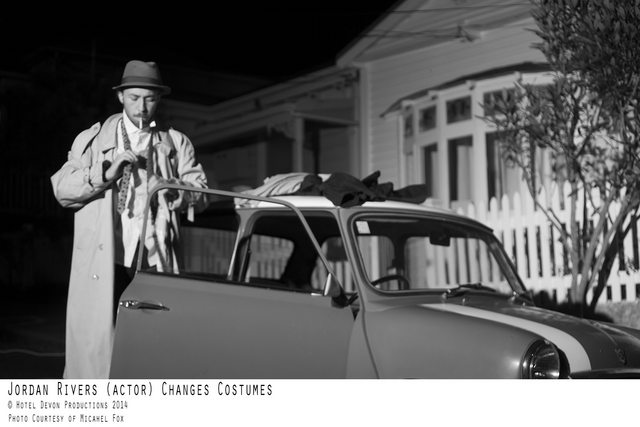I've decided to start a production diary for a short I'll be shooting later this month. The piece is being collaborated on by a few IT users 
I've not done something like this before, and am unsure if people are interested in this (if there isn't much of a response I'll stop posting), but anywho. Please feel free to give feedback on what i'm writing (is it too long? is there stuff you want to know?) as well as the film itself.
Unstuck Production Diary #1 - The Challenges of Co-Writing
Unstuck is a short film about a bouncer, known only to himself as Detective Duffy. Duffy has a hard-boiled detective fantasy, and the film follows him realising his fantasy (kind of) with disastrous consequences.
The idea for the film had been floating around in some form for the best part of the year. Aimee (associate producer, art director, and more) and I decided to write something about a flatmate of mine who has a peculiar fascination with spies. The earliest iteration featured dual protagonists and followed Duffy's quest to find an art thief.
Fast forward several months of talking about the idea, I sat down to actually write something. I don't consider myself a writer, and it was difficult. I wrote half a dozen versions, none of which I liked.
At this point I enlisted the help of Ish Ferris, who is a much more talented writer than myself. Ish lives on the other side of the world to me, which created an interesting, albeit not unusual in this day and age, writing dynamic.
Over a period of a few months, more than 100 emails were sent. Eventually I wrote the first version of the new script, based on our conversations.
Ish hated it.
Well, maybe not hate. But in his own, words he was concerned that we "were working at cross-purposes," that we had different visions for the story.
Challenge #1
Despite talking extensively over several months, we hadn't really communicated with one another. Neither had quite understood what the other wanted.
Of course, this didn't halt things. Film is by definition is a collaborative median, and the ability to deal with creative differences is vital to success.
This minor altercation restated the importance of effective communication from a director. It doesn't matter how creatively or technically gifted you are; you can have the best film in the world inside your head, but if you can't communicate your ideas effectively to your collaborators (I find it can help to think of everyone who works with you as a "collaborator," rather than someone working for you) the film will fail before it even begins.
Thankfully after more discussion, Ish and I were able to clarify the direction we wanted to take the film.
Challenge #2
Ish lives in a time zone 12 hours different from my own. This presents an obvious challenge.
Happily (for the project, not for his health) Ish has an odd sleeping pattern. Despite this, time zone differences did make progress frustratingly slow.
To overcome this, we did on a few occasions have to arrange time that we could both be online.
Challenge #3
Aimee has only been involved in film previously as an actor, and didn't feel confident being involved in the script writing process (despite being a better writer than myself). This created an slightly odd dynamic in which Ish and I co-wrote, while Aimee gave feedback. I acted as a kind of middleman between both.
The process went something like this:
Aimee and I 'created' the basic premise and characters > Ish and I expanded on that > Aimee and I expanded on that > I wrote a new version of the script > Ish and I discussed > Aimee and I discussed > Ish wrote a new version of script > Repeat.
In writing, this sounds messier than it was. It was made easier by the online screenwriting program WriterDuet, which provides a free platform for collaborators to give feedback on specific parts of the script, discuss ideas, and see script revisions from each user.

From left to right: The first lines of the first and latest iterations of the script.
Collaboration, especially online, is a rewarding but at times trying process. It requires strong communication skills and good organisation, and can generally be a strange workflow. But the script we have now is something all of us are proud of. Most importantly something that has excited cast and crew members - it's hard to explain how exhilarating it is to hear someone else enthused about something you've created.
Tomorrow we have our first table read with our cast, and what a talented cast we have. More on that tomorrow.
______
Unstuck is a film being produced for entry into the New Zealand Tropfest Competition in 2015. Director, Jonathan Mines, is keeping a regular production diary here. More updates can be found on Facebook and Twitter.

I've not done something like this before, and am unsure if people are interested in this (if there isn't much of a response I'll stop posting), but anywho. Please feel free to give feedback on what i'm writing (is it too long? is there stuff you want to know?) as well as the film itself.
Unstuck Production Diary #1 - The Challenges of Co-Writing
Unstuck is a short film about a bouncer, known only to himself as Detective Duffy. Duffy has a hard-boiled detective fantasy, and the film follows him realising his fantasy (kind of) with disastrous consequences.
The idea for the film had been floating around in some form for the best part of the year. Aimee (associate producer, art director, and more) and I decided to write something about a flatmate of mine who has a peculiar fascination with spies. The earliest iteration featured dual protagonists and followed Duffy's quest to find an art thief.
Fast forward several months of talking about the idea, I sat down to actually write something. I don't consider myself a writer, and it was difficult. I wrote half a dozen versions, none of which I liked.
At this point I enlisted the help of Ish Ferris, who is a much more talented writer than myself. Ish lives on the other side of the world to me, which created an interesting, albeit not unusual in this day and age, writing dynamic.
Over a period of a few months, more than 100 emails were sent. Eventually I wrote the first version of the new script, based on our conversations.
Ish hated it.
Well, maybe not hate. But in his own, words he was concerned that we "were working at cross-purposes," that we had different visions for the story.
Challenge #1
Despite talking extensively over several months, we hadn't really communicated with one another. Neither had quite understood what the other wanted.
Of course, this didn't halt things. Film is by definition is a collaborative median, and the ability to deal with creative differences is vital to success.
This minor altercation restated the importance of effective communication from a director. It doesn't matter how creatively or technically gifted you are; you can have the best film in the world inside your head, but if you can't communicate your ideas effectively to your collaborators (I find it can help to think of everyone who works with you as a "collaborator," rather than someone working for you) the film will fail before it even begins.
Thankfully after more discussion, Ish and I were able to clarify the direction we wanted to take the film.
Challenge #2
Ish lives in a time zone 12 hours different from my own. This presents an obvious challenge.
Happily (for the project, not for his health) Ish has an odd sleeping pattern. Despite this, time zone differences did make progress frustratingly slow.
To overcome this, we did on a few occasions have to arrange time that we could both be online.
Challenge #3
Aimee has only been involved in film previously as an actor, and didn't feel confident being involved in the script writing process (despite being a better writer than myself). This created an slightly odd dynamic in which Ish and I co-wrote, while Aimee gave feedback. I acted as a kind of middleman between both.
The process went something like this:
Aimee and I 'created' the basic premise and characters > Ish and I expanded on that > Aimee and I expanded on that > I wrote a new version of the script > Ish and I discussed > Aimee and I discussed > Ish wrote a new version of script > Repeat.
In writing, this sounds messier than it was. It was made easier by the online screenwriting program WriterDuet, which provides a free platform for collaborators to give feedback on specific parts of the script, discuss ideas, and see script revisions from each user.

From left to right: The first lines of the first and latest iterations of the script.
Collaboration, especially online, is a rewarding but at times trying process. It requires strong communication skills and good organisation, and can generally be a strange workflow. But the script we have now is something all of us are proud of. Most importantly something that has excited cast and crew members - it's hard to explain how exhilarating it is to hear someone else enthused about something you've created.
Tomorrow we have our first table read with our cast, and what a talented cast we have. More on that tomorrow.
______
Unstuck is a film being produced for entry into the New Zealand Tropfest Competition in 2015. Director, Jonathan Mines, is keeping a regular production diary here. More updates can be found on Facebook and Twitter.










